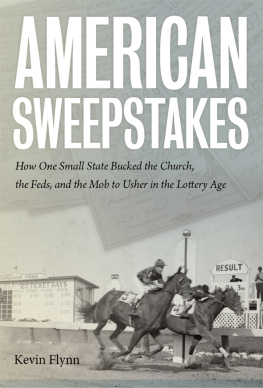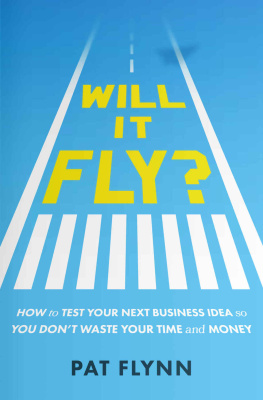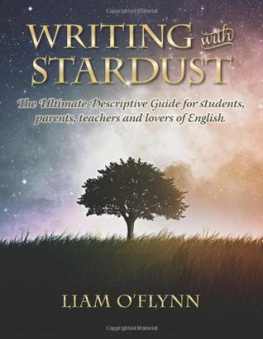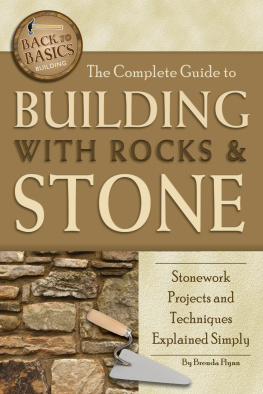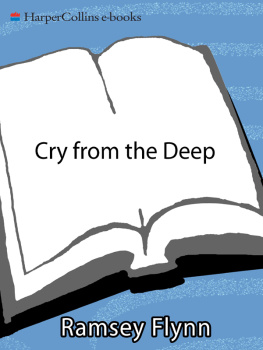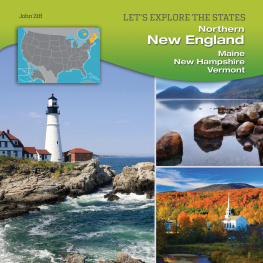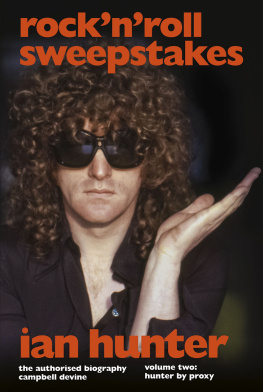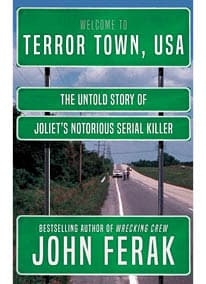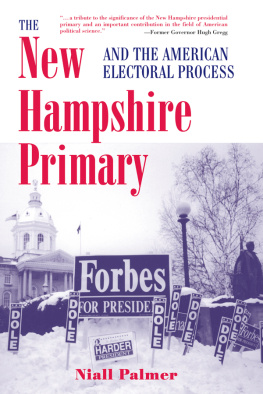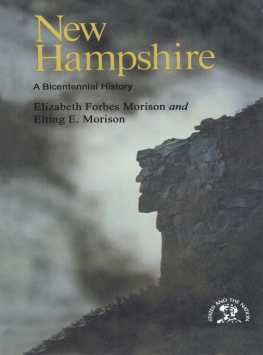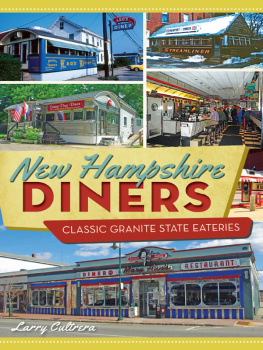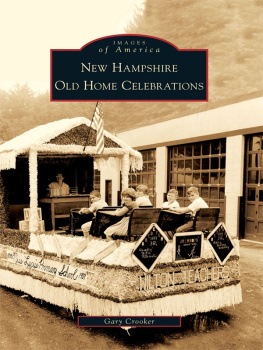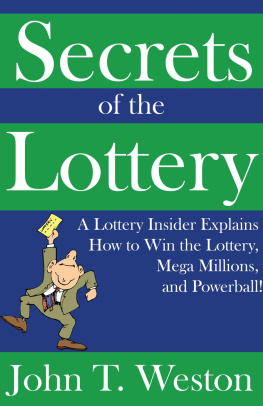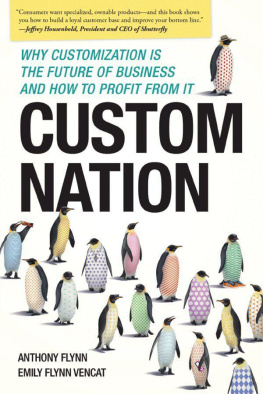Acknowledgments
HAVING UNEARTHED a newspaper-clipping book while working as an outside public-relations consultant to the New Hampshire Lottery, I instantly fell in love with the forgotten story of the sweepstakes and how it changed the world.
While 1964 is hardly ancient history, fifty years is just long enough to make eyewitness accounts few and far in between. Id like to thank those who shared their memories and observations of that time and the personalities involved. They include Lou DAllesandro, Ed Callahan, John Clayton, Brad Cook, Chuck Douglas, Robert Flynn, Sandy LeFleur, Michael Green, Tom Rath, and George Siegel.
For help in obtaining research material and photographs, my thanks to the New Hampshire Institute of Politics and Political Library, the New Hampshire Historical Society, the New Hampshire State Library, the University of New Hampshire, the Manchester (NH) Historical Society and Rockingham Park. Id personally like to thank Jeffrey Barraclough, Thomas Bebbington, Malia Ebel, Neil Levesque, Benot Shoja, Nancy Mason, George Naum, and Michael York from these organizations.
This book would not be possible without the stewardship of the New Hampshire Lottery. Among those Id like to thank are Charlie McIntyre, Maura McCann, and Rose Longo-White.
I very much want to thank the staff at ForeEdge and University Press of New England for their guidance as I stumbled my way through my first attempt at historical nonfiction. They were very accommodating and put their considerable talent toward refining this book. I tip my cap to Stephen Hull, Lauren Seidman, and Bronwyn Becker.
Lastly, Id like to thank my family and my wife, Rebecca, for their patience and encouragement as I spent many hours with my nose in a computer.
Afterword
THE HORSE RACE that started it alland the overwhelming opposition to ithave been swallowed by history. Scandal and sensation, savior and sin, when all of Kings horses ran that thunderous mile and three-eighths, they surreptitiously changed the cultural direction of the nation.
Fearing a rash of litigation that would cripple state operations, Congress finally exempted state-run lotteries from federal anti-lottery laws in 1974. The measure, Public Law 93583, was championed by U.S. Attorney General William Saxbe and finally got the Post Office, the IRS, the FCC, and the Justice Department out of the way.
As more states got into the game (twelve by 1981; thirty-three by 1991), lotteries revolved around scratch tickets. Then came numbers games: pick-them-yourself, daily drawings suspiciously similar to the rackets. In 1975, Massachusetts started selecting its numbers in a half-hour televised, game-show-inspired Big Money Game. All that was missing was General Pierre Gustav Toutant Beauregard calling out the numbers himself.
Next came jackpot lotto games in which grand prizes could grow into the millions of dollars. Then multistate lottery games pushed jackpots into the tens, then hundreds of millions of dollars. Gargantuan payouts are so ubiquitous today that the public suffers from what the industry calls jackpot fatigue in which the casual player isnt motivated to buy a ticket unless the prize is greater than $300 million.
Though it got out of the horse-race business and now refers to itself as the New Hampshire Lottery, the official name of the agency remains the New Hampshire Sweepstakes Commission. When the Instant Sweeps scratch ticket was rolled out in 1975, revenues jumped from $5.5 million to $11 million. In 1977, the Pick 4 daily numbers began and sold two thousand tickets a day. A Pick 3 was introduced. Eventually New Hampshire added a daytime and an evening drawing for both the Pick 3 and Pick 4 (even Dutch Schultzs policy bank only used one number a day).
Long before Powerball or Mega Millions, New Hampshire joined with Vermont and Maine to start Tri-State Megabucks in 1985, the first multistate lottery. Income jumped from $15.2 million in 1985 to $94 million in 1990.
After initially being available in only 49 liquor stores, New Hampshire lottery products can now be purchased in 1,250 different locations. By 2013, annual sales grossed $280 million, netting $74.3 million for schools. Since the first sweepstakes race, more than $1.5 billion has been set aside for education.
In 1962, New Hampshire spent $2.4 million on state aid to education and ranked forty-fifth in the nation for educational spending. In 2012, New Hampshire spent $1.03 billion in state aid to education and ranked forty-sixth in the nation.
IN 1972, the New Hampshire state legislature repealed the biennial town-by-town referendum on the Sweeps. To ensure that money raised went to schools and not property-tax relief, New Hampshire voters in 1990 amended the state constitution to prohibit lottery proceeds from being used on any expenses except education.
THE 1950 BRINKS HEIST took its place in the American conscience as one of the great crimes of the twentieth century. The subject of countless books and magazine articles, it inspired several films including Blueprint for Robbery,Six Bridges to Cross, and, loosely, the original 1960 Oceans 11 starring Frank Sinatra and the Rat Pack.
In June 1956, a Baltimore arcade operator flagged down a cop because some guy had passed a suspicious ten-dollar bill. The note was crumpled and fragile and smelled musty. Police grabbed the suspect in a bar with a roll of $860 in mildewed cash and another $3,720 in his hotel room. An FBI crosscheck of the serial numbers showed the money had come from the Brinks job.
The hood confessed that a guy named Fat John had asked him to launder the money outside of Boston. The bills came from a metal cooler hidden behind a partition in an office wall. The cash had been in $5,000 bunches wrapped in wet newspaper. Ed Powerss men in Boston hit Fat Johns office, ripped apart the walls, and found an additional $51,906 in Brinks money wrapped in wet newspaper.
All of the dollar bills were in various states of decay, some falling to pieces when touched. They were filled with mold and insect remains. The wet newspapers the money had been wrapped in were from 1954, four years after the heist. Lab analysis showed the bills had been damaged before they were packaged in the newspaper, likely having been stored in a canvas bag buried in sand or ashes.
Of the $3 million in cash and checks taken from the biggest bank robbery in American history, only $56,486 was ever recovered.
AFTER LEAVING PRISON in 1960, Brinks stool pigeon Joseph Specs OKeefe moved to California under the name Paul Williams (inspired by Red Sox legend Ted Williams). He worked odd jobs includinghonest to Godchauffeur to actor Cary Grant. All the time, he stayed in touch with that all-American guy, Ed Powers.
OKeefe hated hiding and using a pseudonym. Its a bitch living under a false name. It would be like coming out of a cave, he said. Missing the autumns and winters, he returned to New England in 1973. For a time he moved in with Powers, who helped him find work as a house painter, a hospital security guard, a school janitor, and a bartender.
OKeefe died in California under an assumed name in 1976. Powers declared OKeefe a perfect example of rehabilitation.
THE FALL of the Irish Hospitals Sweepstake began when mastermind Joseph McGrath died in 1965, leaving operations to his son Paddy. The New Hampshire Sweeps had begun to cut into the Irish business, so Paddy McGrath approached the Irish government about starting a national lottery in 1966, but he was turned down.
The deed for each running of the Sweep needed to be signed by the minister of justice. In 1970, citing a shocking lack of detail in its operations, new minister Des OMalley refused to sign the deed until he got answers. What he got were lots of threats from Paddy McGrath about workers getting laid off and political repercussions. Three years later,
Next page
